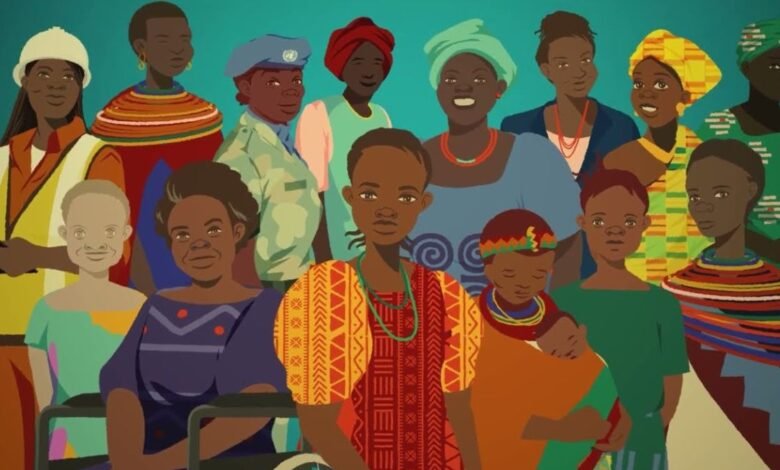International Day of Women and Girls of African Descent: Honoring Resilience, Strength, and Leadership

The International Day of Women and Girls of African Descent is first celebrated on July 25, 2025, to honor, empower, and elevate the accomplishments and voices of women and girls of African descent. Along with celebrating their leadership, dignity, and contributions to cultures around the world, this United Nations-recognized day serves as a global reminder of their resilience in the face of systemic discrimination.
Theme of International Day of Women and Girls of African Descent
The theme for the maiden edition of the International Day of Women and Girls of African Descent is “Rising Together – Women and Girls of African Descent Leading with Strength.”
It draws attention to their crucial role as leaders and agents of change, establishing them as both beneficiaries and trailblazers, influencing transformative progress.
History of the International Day of Women and Girls of African Descent
In 2024, the International Day of Women and Girls of African Descent was formally established. Following a proposal by Brazil and Colombia, the UN General Assembly adopted the resolution, which was supported without objection by member states.
The resolution aimed to emphasize the accomplishments, challenges, and qualities of women and girls of African heritage. The day now stands as a global acknowledgment of their importance and unity in the face of adversity.
Women and girls of African descent frequently encounter obstacles stemming from both gender and racial discrimination. They often experience limited representation, fewer opportunities, and inadequate protection.
This day celebrates their culture, work, and leadership while drawing attention to these challenges. It offers a platform for voices that have long been marginalized to be heard and recognized.
This commemoration aligns with the objectives of the International Decade for People of African Descent (2015–2024), which focuses on justice, development, and recognition. A new decade begins in 2025, continuing these goals. July 25 is now set aside to honor the contributions of this community to global development.
Cultural events, workshops, and speeches on this day contribute to sharing stories and sparking genuine discussions about equality, dignity, and belonging.
Challenges Women and Girls of African Descent Face
Due to the intersecting effects of racial, gender, and socioeconomic discrimination, women and girls of African descent remain among the world’s most marginalized groups, despite their strength, resilience, and untapped potential.
They frequently face systemic barriers that limit their growth and violate their rights, such as restricted access to quality healthcare and education, and underrepresentation in politics and professional spheres.
These intersecting inequalities often manifest as higher poverty rates, fewer educational opportunities, and lack of representation in decision-making roles.
Yet, they continue to rise, leading movements, achieving academic and professional success, advocating for justice, and breaking intergenerational cycles of poverty and exclusion. Their stories illustrate not only the impact of inequality but also the transformative power of equity and opportunity.
From grassroots organizing to professional achievement, their contributions shape communities, economies, and cultures. They are not only beneficiaries of development but leaders of it.
The Way Forward
Empowering women and girls of African descent requires a comprehensive, rights-based approach that includes cultural affirmation and inclusive policymaking.
Governments, communities, and organizations must commit to dismantling discriminatory systems and investing in initiatives that ensure equal access to leadership, healthcare, education, and justice.
Concrete actions include:
- Collecting and analyzing disaggregated data
- Challenging harmful stereotypes
- Implementing targeted, inclusive programs
By taking these steps, the world affirm their dignity while leveraging their leadership, talents, and creativity to build stronger, more just societies.
Ways to Celebrate the International Day of Women and Girls of African Descent
The International Day of Women and Girls of African Descent can be observed in meaningful and thoughtful ways, such as:
a. Host a Story Circle
Bring together friends, family, or community members. Invite women and girls of African descent to share experiences that shaped them. Create a safe, warm, and respectful space for open dialogue.
b. Support Local Creators
Explore literature, music, art, or fashion created by Afro-descendant women. Buy a piece, promote it online, or leave a review. Even small actions help amplify their work.
c. Organize a Panel Discussion
Invite speakers to share insights on issues like education, health, and employment. Encourage interaction and learning. Record the event and share key clips online to broaden the impact. Include classmates, coworkers, or neighbors to keep the conversation growing.
d. Promote Mentorship Initiatives
Connect young girls with role models in science, the arts, technology, or entrepreneurship. Volunteer your time or support programs that foster mentorship. Share your experiences to inspire others to do the same.
e. Participate in Community Events as a Volunteer
Join or support community initiatives focused on maternal health, education, or youth empowerment. Every contribution helps make the day impactful.
f. Share Stories Online
Use social media to highlight the lives, achievements, and perspectives of women and girls of African descent. Share interviews or stories, and use thoughtful hashtags.
UN Effort in Advancing Equality and Justice
According to UN Human Rights, women and girls of African descent, despite leading the fight for justice and equality, continue to face deep-rooted disparities in healthcare, education, employment, and the criminal justice system. Their contributions are frequently overlooked.
The UN stresses the importance of implementing and enforcing anti-discrimination laws, ensuring gender-based approaches in policymaking, and using disaggregated data to inform programs. These steps help align policies with the lived experiences of those most affected.
Conclusion
The International Day of Women and Girls of African Descent is a call to action. It urges the global community to ensure that women and girls of African descent have the opportunities, resources, and support they need to thrive and fully participate in society. Through recognition, investment, and inclusive action, we can honor their legacy and help shape a more just and equitable future.





